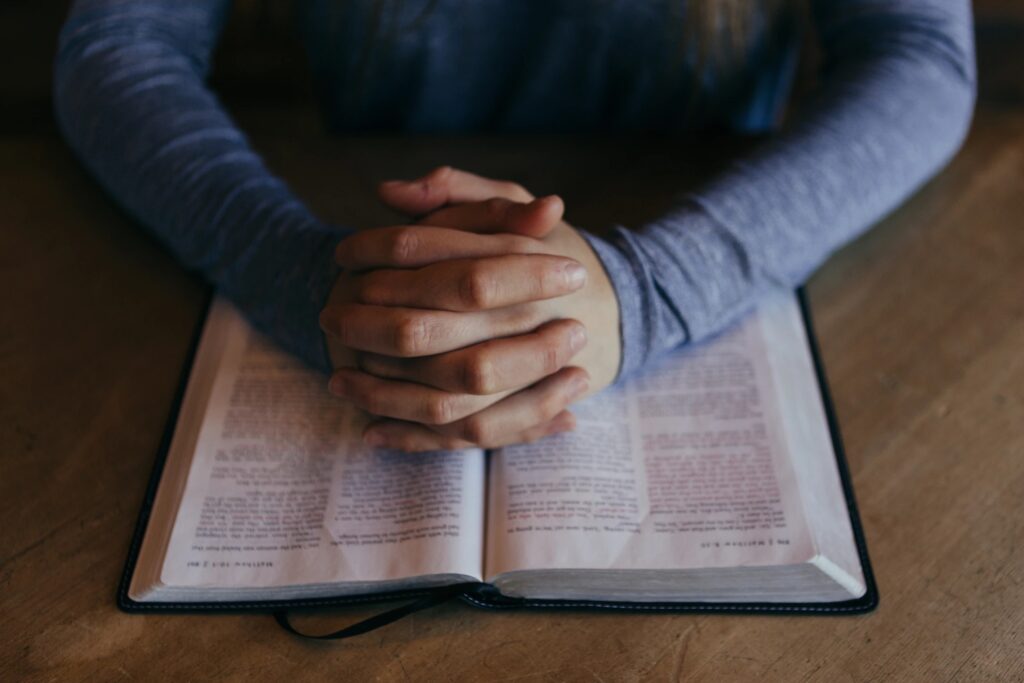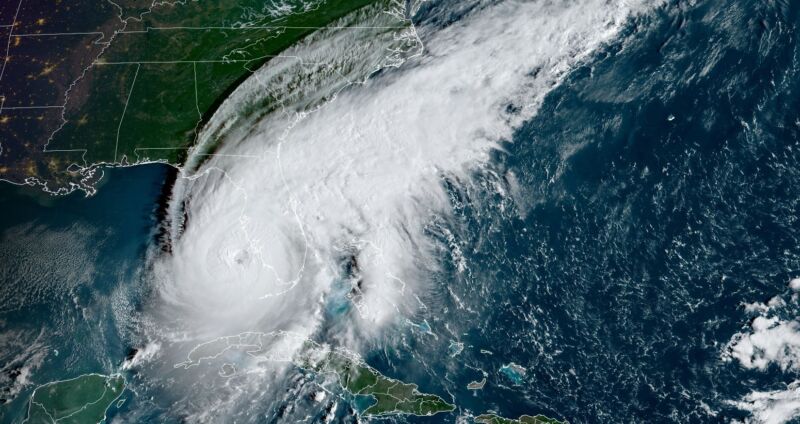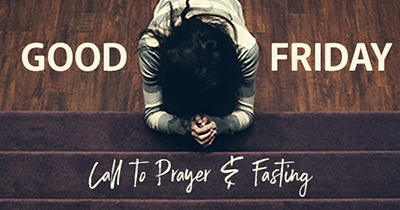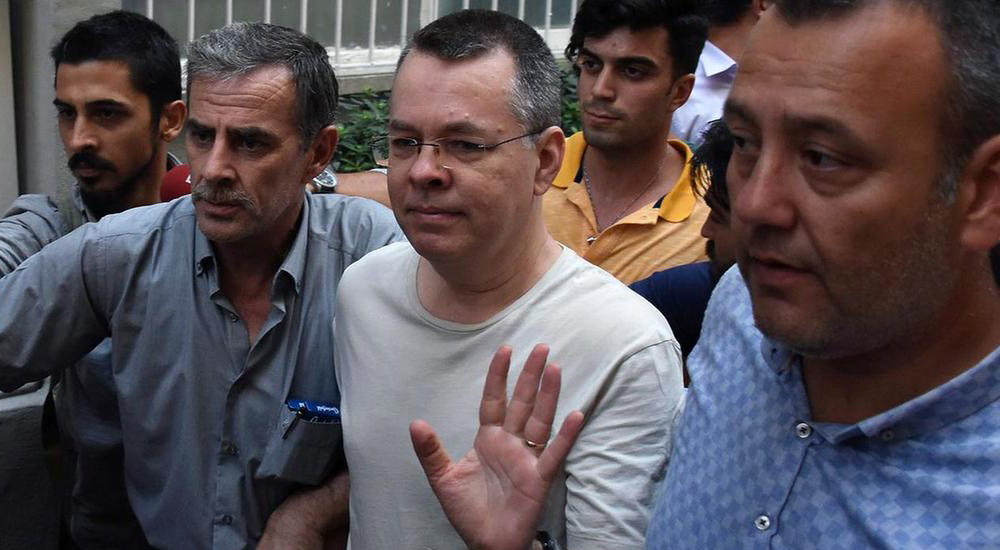
August 2023 Pastor’s Corner — Faith & Prayer

Then the disciples came to Jesus privately and said, “Why could we not cast it out?” He said to them, “Because of your little faith. For truly, I say to you, if you have faith like a grain of mustard seed, you will say to this mountain, ‘Move from here to there,’ and it will move, and nothing will be impossible for you.” — Matt. 17:19–20
And when he had entered the house, his disciples asked him privately, “Why could we not cast it out?” And he said to them, “This kind cannot be driven out by anything but prayer.” — Mark 9:28–29
Sometimes you come across something in the Bible that seems small and innocuous at first, but over time you realize what you thought was little is actually a lot bigger. Jesus is really good at doing that when he is teaching us things. In this case, the little thing I came across was a small difference in how Matthew and Mark relate the healing of an epileptic, demon-possessed boy. This scene takes places immediately after the transfiguration of Jesus. The disciples were not able to cast the demon out, and the Pharisees mocked them for it. Jesus, of course, was able. After Jesus and the disciples entered the privacy of the house they were staying in, they asked Jesus why they weren’t able to drive the demon out. That’s where the difference in the stories comes in, as well as the revelation the Holy Spirit impressed upon me.
As you can see above, Jesus gives a different answer in Matthew compared to Mark. But it’s not actually a different answer, and that’s the part that’s stuck with me for the past few days. What did the disciples need to drive the demon out, more faith or more prayer? Yes. You see, faith and prayer are intrinsically linked together. As William Hendriksen writes, “Where there is little faith, there is little prayer. Conversely, where there is an abundance of genuine, persevering faith, there is also fervent, unrelenting prayer.” When our faith lags, our trust in God erodes. If we aren’t trusting in God, then why would we pray, for is not prayer itself an act and expression of trust? The more deeply I trust in God, the stronger my faith will be, the more constant will then be my prayers.
It is hard, sometimes, to know how our walk with the Lord is going. If someone were to ask you, “how strong is your faith today?” how would you know what to say? It’s such a subjective question. We can often think our faith in God is strong, when we aren’t actually trusting in Him very much at all. However, being asked, “how is your prayer life going?” is much more concrete and objective. As the Holy Spirit has needled at me about this, I’ve come to see a strong and direct correlation between my prayer life and my trust in God. I encourage you to look at your prayer life as well. Are you trusting in the Lord as much as you say or think you are? Does your prayer life reflect that trust and faith? There’s no time like right now to pray!
Rejoice always, pray without ceasing, give thanks in all circumstances; for this is the will of God in Christ Jesus for you. Do not quench the Spirit. — 1 Th. 5:16–19
Blessings,
Rev. David Garrison
Read more...

November 2022 Pastor’s Corner — The God Who Sees You

So she called the name of the LORD who spoke to her, ‘You are a God of seeing,’ for she said, ‘Truly here I have seen him who looks after me.’
— Genesis 16:13
The story of Abram, Sarai and Hagar in Genesis 16 isn’t one we talk about very often, and when we do, it’s usually to make the point that we shouldn’t rush God’s plans or the consequences that come when we take matters into our own hands (which are very valid applications of the story). But if we only focus on that part of the story, we miss something beautiful that happens.
If you don’t remember the story, let me recap briefly: God has promised the childless Abram and Sarai more descendants than there are stars in the sky (Genesis 15:5-6). But they are very old (86, in fact – Genesis 16:16) and are getting past childbearing years. So Sarai gives her servant Hagar to Abram (a culturally acceptable but very bad idea), and she becomes pregnant. Shockingly, Hagar starts to get a little “uppity” with her mistress (Genesis 16:4). Sarai starts abusing Hagar, so Hagar runs away, deciding it’s better to risk crossing the Sinai desert in order to go home to Egypt than stay. Alone, pregnant, with little to no supplies, what must Hagar had been thinking and feeling during those hot days and cold nights? The story doesn’t tell us.
But this is what the story does tell us: Hagar is an Egyptian and not a Hebrew. She never once prays to God. As far as we know, she has no faith in the Lord and the thought of appealing to the God of Abram never crosses her mind. She doesn’t even appeal to the pagan gods of her ancestors. And yet, “The angel of the LORD found her by a spring of water in the wilderness, the spring on the way to Shur.” (Gen. 16:7) The angel of the Lord tells her to go back and submit to Sarai, but then promises, basically, that the promises made to Abram for his son (who hasn’t yet been born or conceived) will be given to Hagar’s son’s descendants. Her response to this is the verse at the top of the article. Nothing has changed regarding her circumstances, but Hagar is filled with hope and praise.
Why? Because now she knows that she has been seen by the Lord. In the midst of her distress and fear, she realizes that she is not alone. Where she has feared for her future, she realizes that God has been and will continue to look after her. Let me emphasize this again: God does nothing to change her situation, in fact He sends her back to Sarai. And it’s likely that Ishmael didn’t experience the promised blessings himself (Genesis 16:12), but his descendants would be princes! “Truly here I have seen him who looks after me.”
Many times we feel the same as Hagar. Lost in our afflictions, our sufferings, our struggles. We are sure that God does not see or hear us in our distress, and we wonder if He even cares. But if God saw Hagar, lost in the wilderness, then God sees you as well. God is looking after you, even if you don’t see it. And while your circumstances may not change (I pray they do!), His promises are still true and sure. He is the God who sees, He is the One who looks after you. Know that you are not alone or forsaken. He is with you, even until the end of the age (Matthew 28:20).
For I am sure that neither death nor life, nor angels nor rulers, nor things present nor things to come, nor powers, nor height nor depth, nor anything else in all creation, will be able to separate us from the love of God in Christ Jesus our Lord.
— Romans 8:38–39
Blessings,
Rev. David Garrison
Read more...

October 2022 Pastor’s Corner – Answering Before We Even Ask

“Ask, and it will be given to you; seek, and you will find; knock, and it will be opened to you. For everyone who asks receives, and the one who seeks finds, and to the one who knocks it will be opened.” (Matt. 7:7–8)
Last month, I wrote about how frustrating it can be when God doesn’t answer our prayers as quickly as we like. This month, I’d like to remind us that more often than not, it’s actually the other way around — God is often answering our prayers before we even ask. I’m writing this on Wednesday morning, as Hurricane Ian is about to make landfall in Florida as an almost category 5 hurricane. By the time you read this, the storm will no longer exist as a named storm and the damage will be done. Take a moment with me to go back to just a day or two before the hurricane’s landfall.
Yesterday, I was driving up the 29N Bypass to pick my daughter up from school, and I saw at least a dozen utility trucks heading south. As you know, Rt. 29 isn’t really a major N/S artery in Virginia – that’s I-81 and I-95. It struck me that if there were that many trucks passing our neck of the woods, how many more are on the interstates, also heading south?
Hundreds of thousands of people have evacuated Florida, which given the size and scope of this storm is a very wise decision. But thousands will stay behind for a wide variety of reasons. Given what Ian did to Cuba, and what Puerto Rico experienced last week, we need to be praying for God’s mercy and protection for those in the path of this storm. This is going to be bad.
But this is what I saw yesterday: God was already answering those prayers. He was already moving into place the people and resources folks along the Gulf Coast are going to need to recover from this storm. God was already in the process of answering prayers that had already been lifted up, and anticipating the prayers that were yet to come. Thousands upon thousands were fleeing the storm, while hundreds were heading toward it. Utility companies from around the country and disaster relief organizations were marshaling their resources and coming together, ready to spring to action the moment the storm passes.
Our God is an awesome, and a very, very good, God. I’m reminded of Psalm 18. I don’t have the space to quote it here, so I encourage you to go read it. As you do, keep this in mind: When the storms of life (both literal and metaphorical) threaten God’s children and we cry out to Him, He springs to action on a storm of his own. Amen, and amen again.
Blessings,
Rev. David Garrison
Read more...

September 2022 Pastor’s Corner – Left On ‘Read’

“O LORD, rebuke me not in your anger,
nor discipline me in your wrath.Be gracious to me, O LORD, for I am languishing;
heal me, O LORD, for my bones are troubled.My soul also is greatly troubled.
But you, O LORD—how long?” (Psa. 6:1–3)
If you are looking for a way to annoy a teenager (and really, who isn’t? It’s so much fun!), one of the best ways is to read a text they send you and not respond to it. This might be a trick that only works on iPhones, but here’s the basic idea. iPhones can send a status update for texts sent to other iPhones, letting the sender know when the message was delivered and read (you can see an example in the picture, look below the text bubble that says “on”). It absolutely drives my daughter crazy when I read her text messages and don’t reply promptly. It upsets her because she knows I’ve received her message, and I’ve even read it, but I haven’t yet answered her. The first time she called me out on it, she exclaimed, “Dad, you left me on ‘read’!” I had no idea what she meant until she explained it to me. While that time was accidental, I now do it all the time, just to annoy her.
The thing is, though, I always respond to her messages, but I don’t always do so via text. I might wait until the next time I see her. I might choose to respond with actions instead of words. I might respond to the text message with an email or a phone call. Sometimes, I’ll respond through her mother or brother. I don’t actually do this to annoy her (most of the time), but because I think those might be better or more efficient ways to respond in the moment.
This has been on my mind lately, because I think there are a lot of times when it feels like God has left us on ‘read.’ We pray, but we don’t hear an answer… or maybe the better way to say it is that we don’t receive an answer from Him in the way we would prefer. If my daughter texts me, she would like a text message back. Promptly. Sometimes, God answers our prayers in very different ways from what we might prefer or desire. Sometimes, He answers our prayers weeks, months, sometimes even years after we lift them up to Him. We know God hears our prayers, the Psalms remind us of that all the time (see Psalm 3:4, 4:3 17:6, 55:17, and 116:1), but it seems like God leaves us on ‘read’ when He doesn’t answer our prayers when or how we would like.
But God does, in fact, always hear our prayers. And He always answers them. Our task is to trust in Him and wait patiently for His answer. His timing is always perfect, and His methods are precisely what we need. The question is, when God seemingly leaves us on ‘read,’ will we continue to trust in Him?
I waited patiently for the LORD; he inclined to me and heard my cry. He drew me up from the pit of destruction, out of the miry bog, and set my feet upon a rock, making my steps secure. He put a new song in my mouth, a song of praise to our God. Many will see and fear, and put their trust in the LORD. — Psalm 40:1–3
Blessings,
Rev. David Garrison
Read more...

September 2021 Pastor’s Corner – 18 Months

It’s now been just about 18 months since this pandemic really started exploding across our country, and what a rollercoaster of an 18 months its been. There was the first few months of initial fear when everything shut down in March of 2020. But as we moved through the summer and the infection numbers in central Virginia stayed relatively low, we began to hope that things would return to normal by the fall, if not Christmas. With the return of school (although not “normal” school) in the fall, that hope continued to rise. But then as we moved into December and January, we saw a severe spike in infections in our area, and our hope began to fade. But then the vaccines became widely available, and numbers began to shrink again through the spring of 2021 – the end seemed to be in sight! Hope burned more brightly through this summer, as numbers in our area continued to decrease and plans to go back to “normal” school were put in place…but an anxiety lurked under the surface as news of highly contangious variants began to spread. And then school did begin, just last week (at the time I’m writing this). Now here we are today, on August 26, after only 6 schooldays, and all secondary schools in Amherst County are closed for a week and the Delta variant is running rampant in our area. Is this ever going to end? What do we do? How are we to hold on to hope in this midst of this rollercoaster of uncertainty?
Consider the wisdom of Psalm 40:
I waited patiently for the LORD;
he inclined to me and heard my cry.
He drew me up from the pit of destruction,
out of the miry bog,
and set my feet upon a rock,
making my steps secure.
He put a new song in my mouth,
a song of praise to our God.
Many will see and fear,
and put their trust in the LORD. (Psalm 40:1-3)
Whenever I read this Psalm, I always think of the picture of the lighthouse above. Look closely. Do you see the man standing in the doorway, completely at ease as these giant waves crash around him? He is still in the midst of the storm, but God has set him securely on the rock and protected him from harm. We would all prefer that God bring an end to this pandemic, and one day He surely will. In the meantime though, He invites us to trust Him even in the midst of the storm. Whether that storm is a pandemic, the loss of a job, a crisis of health, being persecuted for your faith, or any other number of things, the counsel is still the same. Trust in the Lord. He likely won’t remove the storm, but He will hold you safe and secure in the midst of the storm.
As we all become worn out and weary, tempted to lose hope that COVID will ever go away, hold fast to the Lord. Continue to cry out to Him and trust in Him. He might not remove the storm, but He will set your feet on the Rock of Jesus Christ and secure you. As you find His peace in the midst of the storm, may you find yourself singing a new song of praise to Him.
Blessings,
Rev. David Garrison
Read more...

May 2021 Pastor’s Corner – Conviction

“I tell you the truth: it is to your advantage that I go away, for if I do not go away, the Helper will not come to you. But if I go, I will send him to you. And when he comes, he will convict the world concerning sin and righteousness and judgment: concerning sin, because they do not believe in me; concerning righteousness, because I go to the Father, and you will see me no longer; concerning judgment, because the ruler of this world is judged.” (John 16:7–11)
I received some news this afternoon that absolutely threw me for a loop. The news itself wasn’t particularly bad or good, and really wasn’t even directly for or about me. And yet, it absolutely threw me off balance and left me in a place of profound introspection and self-examination. For whatever reason, it “laid bare my soul” and I found myself questioning much of what I thought I knew, believed and took for granted even just a few hours ago. What was it that caused me to react in such a way?
Conviction. Specifically the conviction of the Holy Spirit.
One of the reasons Jesus sent us the Holy Spirit is to convict us of our sin. Not in a “you’re a horrible, miserable person and I want you to feel guilt and shame” way, but rather a “sin keeps you from the fulness of life I bought for you on the cross, so let’s get rid of as much of it as we can” kind of way. We have an amazing ability to get comfortable with our misaligned priorities and values. Those priorities and values are probably not necessarily bad in and of themselves, but if they are more important to us than God and His Kingdom, then they are sinful and not righteous — it’s a subtle form of idolatry. It’s not necessarily that we have to get rid of those values and priorities, just that we need to put God’s values and priorities first. In the Sermon the Mount, Jesus said, “But seek first the kingdom of God and his righteousness, and all these things will be added to you.” (Matt. 6:33) I need to put God’s kingdom first, and trust Him to provide the rest.
The Holy Spirit used the news I received to shine a light on a couple of areas in my life where the kingdom of David was more important than the Kingdom of God. I’ll be honest, it wasn’t fun, and I spent quite a while doing some phenomenal self-rationalization and self-justification with God. And, honestly, I’m still working through it. I don’t like being told I’m wrong or in error, and I’m sure you don’t either. But I also know that God is shining the light in these areas of my heart because He loves me and wants His best for me. The same is true for you.
One of the key aspects of growing in holiness and faithfulness is keeping a soft heart that is sensitive to when the Holy Spirit is at work in us, convicting us of the areas in our lives that aren’t aligned with God’s heart and vision. As we celebrate the coming of the Holy Spirit on Pentecost this month, I pray that each of us would have tender hearts, shaped and formed by the Spirit of God in the image of the Son of God.
“…he disciplines us for our good, that we may share his holiness. For the moment all discipline seems painful rather than pleasant, but later it yields the peaceful fruit of righteousness to those who have been trained by it.” (Heb. 12:10–11)
Blessings,
Rev. David Garrison
Read more...

March 2021 Pastor’s Corner – Casting Your Cares

Cast your cares on the LORD and He will sustain you;
He will never let the righteous be shaken. — Psalm 55:22Cast all your anxiety on him because he cares for you. — 1 Peter 5:7
How are you doing, really? By the time this month ends, we’ll have lived in this pandemic with the ensuing quarantine and social distancing for an entire year. While some are anticipating that we’ll reach “herd immunity” by April, President Biden is suggesting that we shouldn’t expect a return to “normal” until Christmas. I think we’re all feeling the weight and strain in a heavier, more difficult way right now. It’s the weariness of being under stress and anxiety for a far longer period of time than our minds, our bodies and our emotions were meant to endure. And, of course, on top of the pandemic sits all of the pain and hurts that simply come with being human and being alive — pains and hurts that can be difficult enough to bear when we aren’t in a pandemic, but become nearly impossible to bear due to the pandemic. What are you doing with your hurts and pains (emotional and physical), the anxieties and fears, the weights and burdens of living in these hard times?
As the verses above remind and encourage us, God wants us to bring all of our cares and anxieties to him. But just what does that look like? I’m sure most of us have, at some point in time, cried out to the Lord and verbally thrown everything at him at once. That can be therapeutic — much like the whistle of a teapot lets off the pressure of the boiling water — and if you haven’t unburdened your soul that way in a long time, I absolutely encourage you to do so. But, if you have done that, you’ve probably found the same thing I have: while the immediate pressure release is helpful, the burdens and weights are still there. I’d like to invite you to try an ancient spiritual practice that helps us to hand our cares to the Lord in a more intentional way, a way that invites the Holy Spirit to sustain us more deeply.
The Daily Replay
The process is called The Daily Examen and was developed by St. Ignatius centuries ago. It is a 5-step process of prayerfully reviewing your day and anticipating the day to come. While meant to be practiced each day, it can be prayed at any point during the day. How long you take to work through the prayer is up to you — it could be as short as 5 minutes or as long as you need. Here’s an overview of what the process looks like:
1. Become aware of God’s presence.
Take several moments to breathe, relax, and invite God to be present with you.
Sometimes settling our body and mind is really difficult, especially when we have a lot going on.
One trick is to focus on our breathing. When we breathe slow and deep, we let our body and souls know that it is okay to relax and rest in God’s presence. Slowly take three seconds to breathe in through your nose, making sure to fill your belly with air . . . and then take three seconds to breathe out slowly through your mouth. Pause, then breathe in again. Repeat that a few times.
As you continue to breathe deeply and slowly, acknowledge God’s presence with each breath.
(Pause for a few moments)
2. Review the day with gratitude.
Look back through your day as if you were watching scenes from a movie. What happened? What were you like? What were others doing around you?
What are the good things that have happened today? What can you give thanks for?
(Pause for a few moments)
3. Pay attention to your emotions.
Ask yourself about how you felt at different points during the day.
What moments throughout your day have been difficult or tense?
When did you feel happy, excited, or at peace?
(Pause for a few moments)
4. Forgive, and ask for forgiveness.
Who are you angry or frustrated at?
Are there things you can forgive and let go in order to have peace?
What would you like to be forgiven for?
(Pause for a few moments)
5. Look toward tomorrow.
How might tomorrow be different?
What would you like to ask God to help with?
(Pause for a few moments)
Take some time to wrap up your conversation with God silently.
This kind of contemplative prayer can seem strange at first, but once we settle into the rhythm of it, I think you’ll find your awareness of the presence of God is growing stronger. Instead of just throwing our cares at God, through this process we more intentionally place them in God’s hands. Here are a few online resources to help you with The Daily Examen:
- A video walk-through of the prayer: https://fullerstudio.fuller.edu/prayer-of-examen/
- Using The Examen with teens and children (the above walkthrough is from this site): https://fulleryouthinstitute.org/blog/teaching-young-people-a-daily-way-to-pray
- A deeper look at The Examen: https://www.ignatianspirituality.com/ignatian-prayer/the-examen/
Blessings,
Rev. David Garrison
Read more...

A Call to Prayer and Fasting – Good Friday, April 10, 2020

Read more...

April 2020 Pastor’s Corner – The Conundrum of the Cluster

The Conundrum of the Cluster
The Church Scattered
The Church Closed. Or is it?
A couple of years ago, God gave my associate pastor a vision of our church having transparent walls. For two years, we have been wondering how on earth God was going to turn stone and stained glass into transparent walls. We got the interpretation today. He’s making them transparent by locking our doors. Suddenly people will be able to see in from the outside! May God make transparent all the walls of our churches, that the world may know the Good News of Jesus Christ… He has been preparing us for this since November. We just didn’t understand what he was saying until now. Our church is being called to love and serve one another. We are the church sent out, not the church closed!
The Church Sent Out
Rev. David Garrison
Read more...

Andrew Brunson Prayer Update

Read more...
